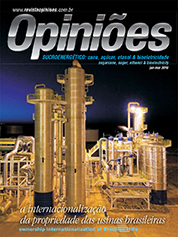Reinhold Stephanes
Minister of Agriculture
Op-AA-23
Foreign investments in sugarcane: partnership in opportunities
The sugar and ethanol industry, now referred to as the sugar-based energy industry, is a tremendous source of opportunities. The current success of the Brazilian economy enhances it even further. To have achieved “investment grade” in the assessment of international credit rating agencies has placed Brazil on the investor map. Agribusiness has received special attention, in what is a wave of mergers, acquisitions and the creation of new companies that transcends the sugarcane industry, albeit the latter is one of the main protagonists of this movement.
It is also good to see the international interest in an activity that has received the deserved support from the Brazilian government that intends to play an active role in the required change of the world energy matrix. The transformation of ethanol into a product sold internationally (commodity) is an objective of the industry itself.
Therefore, growing the investment potential should be welcomed. Investments in the production of cane, sugar, ethanol, energy from biomass and ethanol-based chemistry in the past five years have been surprising. From 2005 and until 2011, 115 new units were/will be installed, requiring investments of approximately US$ 40 billion.
Such an impressive flow of funds is only feasible if projects’ economic sustainability is clear. It is what allows seeking social and environmental sustainability required by the market and by governments that propose to make their countries’ energy matrix cleaner. In awakening the interest of international investors, the industry provides proof of this tremendous potential, attracting important partners, while al-lowing anticipating goals and providing more safety to the development of the National Agro-energy Program.
Access to foreign markets is facilitated through the diversity of international experience obtained by new investors in trading goods, access to transportation logistics and to updated price protection mechanisms is facilitated, one obtains technologies not yet available in the domestic market, and new investments in new technology and product research are made feasible.
One accelerates the recovery of important companies that, albeit operationally efficient, unfortunately, and in view of the international financial crisis, erred in making decisions about sources of financing. The flow of new capital to this activity should also be viewed as a subsequent step in the intensiveprofessionalization that for several years has been in progress, having allowed Brazilian business groups that produce sugar and ethanol to go public, opening their capital.
The business environment is modernizing and becoming stronger, leaving behind an entrepreneurism of typically family-oriented businesses, which, though successful, must now adapt to business evolution and even to that of families themselves. One loses a bit of the romantics of bygone ages, but one should not forget or neglect the memory of entrepreneurs who allowed our country to now immerge in this promising and fantastic world of renewable and clean energy.
A source that may assure human existence in a more dignifying way, with better quality of life. Energy based on work and the economic and social development of promising regions, but still in the development process. Clean energy, used peacefully, becoming even more peaceful when aggregating partners from all over the world.
Knowledgeable as they are of these sustainability objectives of the Brazilian agro-energy production project, in which social and environmental requirements are strongly anchored in legislation, and while such investors come from regions that every day increase such requirements, one should expect that their commitments to the sustainability requirement is also very strong.
Like their interests in third countries, possible future consumers will surely make it difficult for our products to become the object of discriminatory trade barriers that prevent the development of these markets. Significant international investment flows only occur in business and on special occasions. The globalization of the world economy has resulted in temporary waves in some industries and regions. In the present case, this apparently is not so. We are faced with investments that have been consolidating over the years, warranting a promising activity that, in combination with Brazilian capital, will surely contribute to the effective use of the opportunities one may envisage for the industry.




